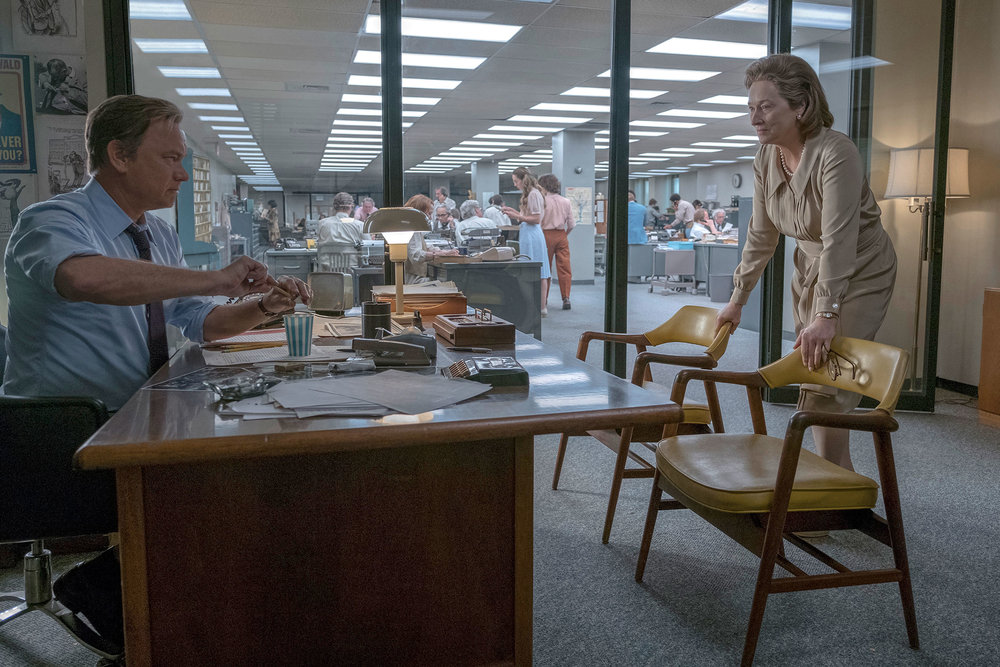The Post (2017)


SHOULD I SEE IT?
YES
Spielberg. Streep. Hanks. The line forms over there.
Completed within just a few months' time in 2017, The Post is an urgent, of-the-moment, dramatic thriller that brings the past to the present and draws distinctive parallels from the 1970s to today.
Impeccably made, with Streep and Hanks deservedly in the Oscar conversation, The Post also is masterfully made by Spielberg and his team.
NO
Hits a few of its points so squarely on the nose, you can hear and feel the eye rolls from around the room.
A movie that preaches to the choir. There are some who will watch this and reject it as being opportunistic Oscar bait, and only made for a specific purpose and audience.
While the history lessons are important, and Spielberg allows context to grow for a better overall understanding as to what's occurring, the smartphone generation may not care a lick about any of this. Which is an absolute shame, but, alas, here we are.
OUR REVIEW
In Steven Spielberg's The Post, the year is 1971. Newspaper the Washington Post is, at this time, a smaller, scrappy “local” paper, overseen by ambitious editor Ben Bradlee (Tom Hanks) and publisher Kay Graham (Meryl Streep).
Graham took over the paper following the suicide of her husband a couple years prior, and she is still attempting to settle into the role of being in charge. Bradlee sees the opportunity for growth and expansion and Graham trusts him, even if they bicker and prod one another routinely. Graham is anxious to move forward with an initial public offering for her company, one which may make all the financial sense in the world, but also means her paper is no longer as easy to manage and control.
Everything changes when military analyst Daniel Ellsberg (Matthew Rhys) releases the Pentagon Papers in 1971. Serving under Robert McNamara, our then-Secretary of Defense, Ellsberg exposed a multi-year, multi-Presidential, several decades cover-up regarding the conflicts which led to the Vietnam War. At this point, the country was bitterly divided over Vietnam, and Ellsberg’s leaking of top secret documentation proved that previous administrations had not be forthright and honest in our motivations with the Vietnam conflict.
Consider those public fires freshly stoked.
Spielberg balances the inner workings of the boardroom, the internal conflict present within Graham, the almost strategic nature of Bradlee’s decisions, with the political turmoil popping around these characters like popcorn in a high-heat popper. The Post is a procedural of sorts, taking us through the many layers and nuances of what turned “WaPo” from a small fish in a big pond, to a definitive voice in journalism for the decades which would follow.
Together, for the first time, Hanks and Streep are electric. In scene after scene, they esteem a loyalty among each another that creates a bond between Bradlee and Graham tighter than most would anticipate. The Oscar-winning actors take great joy in the screenplay of first-time writer Liz Hannah and Josh Singer (Spotlight), who somehow find a way to not only orient us to the politics of the news, the world, and within the Washington Post’s boardrooms, but also identify and bring to light striking similarities and parallels to the world we are in today.

Spielberg calmly slices his way through the dense thicket of context and pushes us through the story, beautifully shot by Spielberg’s cinematographer Janusz Kaminski, and impeccably scored by the timeless (tireless?) John Williams. Together, the elements of sight and sound, and some authentic costuming as well, find us transported to a time, nearly 50 years ago, that feels old and new all at once.
In 2018, newspapers are under attack, both in terms of viability and sustainability, and from an administration who reminds us every day that what we read is #FakeNews. While journalism has forever been changed with the arrival of the internet and the proliferation of blogging, we see, in terms of journalistic trade and practice, an urgency and dedication to craft that has not changed.
While Ellsberg’s Pentagon Papers serves as a catalyst for what lies at the heart of the conflict within The Post, and sets up the film as something of a companion piece to the classic All The President’s Men, a significant takeaway from all of this is how the film underscores and champions the importance and necessity of the working press.
Graham and Bradlee at times do all they can to simply hold on the the Washington Post, unsure of where all Ellsberg's controversies will take them personally and in their careers. Threats come from out of the blue, President Nixon is on the attack, and Spielberg builds terrific suspense in the ultimate decision – do we publish or not?
At times, Hannah and Singer hit their points too squarely on the nose. Spielberg, proud of his politics, cannot help himself when he opts to slowly zoom in on a female reporter’s verbal recitation, while on the phone, of a favorable court ruling. And perhaps this actually happened, but I’m not sure Kay Graham ever walked through a crowd of adoring and grateful women, applauding her, on her way out of a courthouse.
But I can indulge Spielberg these dramatic flourishes. He has crafted an urgent, of-the-moment story, set nearly 50 years in the past, but existing very much in our present day world. With two of the greatest actors to ever ply their craft, disappearing into characters right before our eyes, The Post is an important and necessary button to fasten in wrapping up a polarizing and challenging 2017.
CAST & CREW
Starring: Meryl Streep, Tom Hanks, Sarah Paulson, Bob Odenkirk, Tracy Letts, Bradley Whitford, Bruce Greenwood, Matthew Rhys, Alison Brie, Carrie Coon, Jesse Plemons, David Cross, Zach Woods, Pat Healy, Michael Stuhlbarg.
Director: Steven Spielberg
Written by: Liz Hannah, Josh Singer
Release Date: December 22, 2017
20th Century Fox
